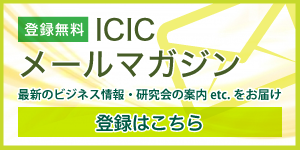2017年11月25日(改訂版)
Revised edition November/25, 2017
グローバルヘルスイニシャティブ準備委員会
Global Health Initiative Preparatory Committee
健康医療分野における国際的連携や取組みを必要とするグローバルヘルス領域の推進を各地のヘルス関連クラスターの国際連携から実現を目指す連絡会議、グローバルヘルスイニシャティブ(GHI)について
Regarding Global Health Initiative, a project that seeks to achieve international cooperation on health-related clusters in various locations to promote the international cooperation and efforts in the health and medical care sectors that the global health field requires
===================================
1.基本的な考え方
(1) グローバルヘルスやクラスターの考え方
・広義のヘルス領域(公衆衛生や医療、医療支援技術、予防や健康、健康の為の食や栄養、水問題、運動、癒し抗疲労、美容、福祉、環境、紛争対策等)を対象とする。
・広義のヘルス領域の科学技術や政策、産業化、疾病や健康増進、医療の地域や所得、紛争による格差、医療費高騰の課題解決、異分野の参入によるイノベーションなど幅広く捉える。
・UHC(Universal health careまたはUniversal health coverage)とSDGsしての国際医療支援や感染症対策、ビジネスのグローバル化などクローバルヘルス概念も広く検討
・リサーチパークや産業団地などの地域集積拠点や国際的な特区地域、学会や業界団体、経済団体、大型プロジェクト、国際機関やNGO活動とその連携体など健康医療に関わる開発や事業、市場、現地活動を含む集積、集合体を当面対象とする。
1. Basic philosophy
(1) Thinking regarding global health and clusters
・The subject will be the field of health in the broad sense-public hygiene and medical care, medical care support technology, prevention and health, food and nutrition for health, water issues, exercise, healing and fatigue reduction and prevention, beauty care, welfare, environment, dispute resolution initiatives, and so on.
・This is broadly perceived to include such things as scientific technology and policies for the field of health in the broad sense; industrialization; illnesses and health promotion; medical care disparities related to region, income, and conflicts; resolving the issue of skyrocketing medical costs; innovations from participation of other sectors.
・We will also broadly consider international medical care support and anti-infectious disease measures as UHC (universal health care or coverage) and SDGs (sustainable development goals), and global health concepts such as the globalization of business, etc. ・Interim subjects will be clusters that include development, projects, markets, and local efforts related to health and medical care, such as regional cluster sites (e.g., research or industrial parks) or international special zones. academic societies or industrial associations, economic associations, large projects, and the efforts of international agencies and NGOs and entities that partner with them.
(2)グローバルヘルスの重要性
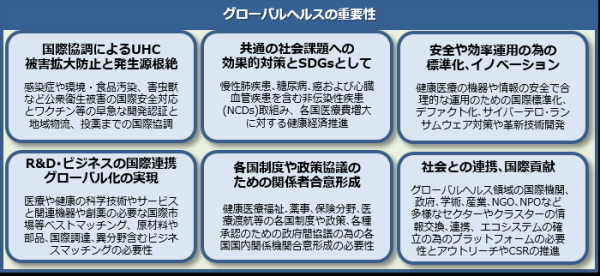
(2) The importance of global health
・UHC through international cooperation as well as preventing the spread of and damage from pandemics and eradicating their sources
International safety responses to harm to public health such as infectious diseases, environmental and food contamination, pests, and vermin; and international coordination on everything from rapid authorization for developing vaccines to local logistics and prescribing medicine
・Effective measures for social issues in common and SDGs
Efforts on non-communicable diseases (NCDs), including chronic pulmonary disease, diabetes, and cardiovascular disease; and promoting health economics in response to increasing medical care costs in each country
・Standardization and innovation for safe, efficient operations
International standardization and de facto standards for safe and efficient management of health and medical care equipment and information; responses to cyber terrorism and ransomware; and development of innovative technology
・International R&D and business partnerships and achievement of globalization
Necessity of the best matching of international markets and such needed for scientific technology, services, related equipment and drug discovery related to medical care and health; and necessity of the business matching that includes different sectors
・Build consensus among relevant parties for the purposes of discussing respective countries’ systems and policies
Necessity of building consensus among individual countries’ relevant domestic institutions so that governments can discuss their respective health and medical care welfare and insurance sector systems, policies, and various types of approvals with each other
・Coordinating with the community, international contributions
Exchanging information at each level, including international global health field agencies, governments, academia, industry, NGOs, and NPOs; necessity of partnership platforms; promoting outreach and corporate social responsibility (CSR)
(3)-1 グローバルヘルス推進や国際連携の課題

(3)-1 Issues related to global health promotion and international partnerships
・Diverse related government administrative, academic and industry organizations
Wide range of health and medical care-related policies and administrative organizations are involved, and there is a shortage of policies, opportunities, funds, and participation by different sectors, among other things, in order to promote new efforts.
・Systems and safety standards that differ by country
Difficulties with approvals and dissemination due to differences in health and medical care sector concepts, safety standards, approval systems, culture, ethical perspectives, and perceptions related to the field; approval measures in times of emergency
・Necessity of partnerships among different sectors arising from technological progress
Expectations for innovations brought about by different sectors’ technologies, including the growth fields of information and communications technology, the “internet of things” (IoT), and artificial intelligence (AI), robots, energy, and biotechnology, among other things; and the lack of opportunities to participate
(3)-2日本や関西での課題解決や可能性
・海外展開(輸出や海外進出)と国内投資(企業誘致や国内進出、投資促進)分野の分離

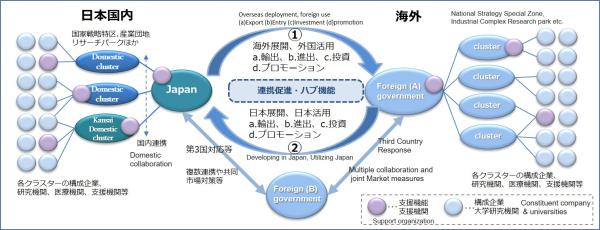
(3)-2 Problem-solving and possibilities in Japan and the Kansai region
・Roles of international agencies and diplomatic offices
Lack of personnel dedicated to this sector and specialized personnel in various countries’ government diplomatic missions; lack of Kansai branches; separation between areas of overseas expansion (exports or setting up operations in other countries) and domestic investments (attracting companies and promoting establishment of domestic operations and investments)
Relationship between overseas expansion of Japan and a foreign country (exports and investments) and promoting investments and attracting companies domestically
・Too little information and shortage of human resources
Lack of relevant information needed to promote global health, cluster-related information acquisition, and dissemination in multiple languages; shortages of human resources for such things as promotion, special purposes and hiring related to this sector; and lack of related educational institutions and programs ・Individual clusters’ partnership opportunities
Shortage of partnerships among diverse global health clusters; lack of R&D and field testing related to international needs; corporate and other regional clusters’ decentralization and partnerships; weakness of international expansion; lack of distribution systems for relevant information
(4) グローバルヘルスの実現ための方策
・各国政府機関や経済団体の認識の共有化と政策への反映、政府間協議や事業協議の実現
・活動の持続性構築の為にも国際的ビジネス展開も視野に入れた、国際機関やNGOを含む産学連携や金融連携、地域連携などのネットワークが重要
・個別最適化、1企業間連携支援より、クラスター連携支援による効果と効率性がある ・本分野の国際連携を推進するための人材(コーディネーター等)不足の解決策と育成、また、本領域の学問体系未成熟に対する体系化と開発
(4) Policies for achieving global health
・Promoting shared awareness among individual countries’ governmental institutions and economic associations and reflecting it in policies; bringing about discussions among governments and project discussions
・In order to carry out all activities in a sustainable manner, partnership networks-such as industry-academia, finance and local partnerships that include international agencies and NGOs and that bear international business development in mind-are important
・Support for cluster partnerships is more beneficial and efficient than individual optimization or support for partnerships among single companies
・Resolving the shortage of human resources to promote international partnerships in this sector and providing training; developing systematization for underdeveloped academic systems in this field
(5) グローバルヘルスクラスター連携のための方策
・関係する各国政府機関や自治体、本分野支援の経済団体、クラスター支援機関の情報交換、人的交流機会の創造が必要
・各クラスターの活動内容、連携要素、課題やニーズの情報交換、人的交流機会の創造が必要
・クラスターマネージメントの考え方とクラスターマネージャー交流(networking)
・各クラスター共創によるインパクト事業の選定と成功モデル、推進プロセスの検討
・クラスター支援機関、及びクラスターに対するマネージャーの他、リエゾン業務支援検討とグローバルヘルス人材、リエゾン人材の発掘、育成
・連携支援の為の予算計画、活動資金や活動拠点の確保、整備、総合的な業務機能と内容、組織化など方策検討
・連携支援活動そのものによる経済効果、周辺波及性、関連事業の整理
(5) Policies for global health cluster partnerships
・There is a need for relevant individual countries’ government agencies and local governments, economic associations that support this sector, and cluster support organizations to exchange information and create opportunities for interaction among human resources
・There is a need to exchange information about the content of respective clusters’ activities, partnership elements, issues and needs, and also there is a need to create opportunities for interaction among human resources ・Cluster management philosophies and interaction among cluster managers (networking)
・Selection of programs that will have an impact (and that are jointly developed by individual clusters) and consideration of successful models and promotion processes
・Along with cluster support agencies and managers for clusters, review support for liaison work; scout and train global health personnel and liaison personnel ・Review policies concerning partnership support budget plans, obtaining and providing activity funding and sites, comprehensive operational capabilities and content, and setting up organizations
・Check and review economic benefits from partnership support efforts in and of themselves, peripheral ripple effects, related projects
2.具体的な進め方
(1) 本分野の調査研究
・先ずは関係者が集まる事が重要、集まる機会の設定(networking)
・各国各地の政府機関や経済団体、関連クラスターの情報交換会を試験的に関係機関連絡会議(networking)として実施、会議を段階的に拡大、充実、継続する。
(第1回2017年9/5、第2回2017年11/7、第3回未定)
・テーマや目的、国や地域による分科会ワーキング(working group)を設置し、個別協議や課題解決などの実践を試行的に開始する。
・グローバルヘルスや各国、各機関、クラスター、構成企業や機関の課題やニーズの調査、研究を試行的研究会として開催し、成果を活用
・初期の開催運営のための機能の分類」
①事務局会議、
②関係機関連絡会議(networking)
③グローバルヘルスイニシャティブ準備会議
④分科会・ワーキング(試行的研究会・研究会セミナー)の設置
2. Specific ways of moving forward
(1) Investigative research in this field
・First, it is important for relevant personnel to get together and to create opportunities for getting together (and networking)
・Exchanging information (networking) meetings among respective countries’ and regions’ government institutions, economic organizations and related clusters will be held as provisional exploratory liaison conferences; the meetings will be incrementally expanding, improving and continuing. (1st meeting on September 5, 2017 and 2nd on November 7, 3rd not yet scheduled)
・Subcommittee working groups for topics and objectives can be set up by country or region and such things, and practical individual discussions and problem solving will be provisionally carried out.
・Workshops will be held on a trial basis to investigate and conduct research into global health and respective countries’ and agencies’, clusters’, and constituent companies’ and institutions’ issues and needs; making use of the results.
・Classification of functions for initially holding and running meetings
① Executive office meetings
② Liaison conferences for relevant organizations (networking)
③ Global health initiative preparatory conferences
④ Setting up subcommittees and working groups (trial workshops and workshop seminars)
(2) 事務局会議
・初期段階の幹事機能として大阪商工会議所と公益財団法人都市活力研究所、及び新産業文化創出研究所(ICIC)、他が、本計画推進のための事務局を担う。
・事務局は都度、関係機関の担当との連絡や要望の把握と対応、有識者を含めた会議や試行的研究会の計画立案や運営事務作業等の打合せを行う。
(2) Executive office meetings
・The Osaka Chamber of Commerce and Industry, Urban Innovation Institute (UII), and Institute of Creative Industries and Culture (ICIC) will mainly handle organizational functions during the initial phase, acting in the roles of executive offices to carry out this program.
・The executive office will continuously confer about communication with relevant institutions’ personnel in charge, understanding and handling requests, and the office’s tasks of planning and running programs for meetings that include experts and trial workshops.
(3) 関連機関連絡会議(情報交換会としてのnetworking)
・情報交換の場としての関係機関連絡会議(ネットワーキング)の開催とGHI準備会への発展
・グローバルヘルスや関連クラスターの活動を支援、また監督、運営する関係機関を想定。
(3) Liaison conferences with relevant agencies (networking to exchange information)
・Liaison conferences with relevant agencies will be held to network and exchange information, progressing to GHI preparatory meetings
・This assumes that “relevant” agencies will be those that support, supervise, or organize the activities of global health or related clusters.
①構成機関
・国際機関、外国政府行政機関、在日公館(大使館、領事館、貿易センター等) ・外国の経済団体や業界団体、在日の機関(在日商工会議所等)
・日本の行政機関、本分野支援機関等(経済産業省、厚生労働省、農林水産省、文部科学省、観光庁、金融庁、JETRO、公的研究支援機関、公的クラスター支援機関、ほか)
・自治体関係(関西の地方自治体、府県、市町村、自他体関係支援機関、他)
・経済団体、業界団体(関西の経済団体、医療健康関連業界団体、他)
・NGO (グローバルヘルスに関わる国際団体、NPO等市民団体、現地活動機関等)
・主要クラスター運営機関、構成機関(地域クラスター、特区地域、サイエンスパーク、関連プロジェクト、他)
① Constituent organizations
・International agencies, foreign government administrative agencies, diplomatic missions in Japan (embassies, consulates, trade centers, and so on) ・Other countries’ economic and industry organizations, institutions in Japan (such as chambers of commerce)
・Japanese administrative organizations and agencies that provide support related to this field, including, among others, the Ministry of Economy, Trade and Industry, the Ministry of Health, Labour and Welfare, the Ministry of Agriculture, Forestry and Fisheries, the Ministry of Education, Culture, Sports, Science and Technology, Japan Tourism Agency, Financial Services Agency, JETRO, and public institutes that support research and clusters
・Local government-related, including, among others, local Kansai regional, prefectural, and municipal governments and agencies that support local governments
・Economic and industry organizations, including, among others, Kansai area economic associations and health and medical care-related industry organizations
・NGOs, including, among others, international organizations involved in global health, NPOs and other civic organizations, and local grass roots organizations
・Leading cluster management and constituent organizations, including, among others, regional clusters, special zones, science parks, and related projects
②検討内容
・各国、各機関の課題やニーズの把握、取り組む業務やプロジェクトの紹介と協力方法
・各クラスターの課題やニーズの把握、取り組む業務やプロジェクトの紹介と協力方法 ・外国企業、大学研究機関の日本進出や日本展開での課題や支援策の検討
・日本企業や大学研究機関などの海外誘致や投資促進、技術連携や事業連携の課題解決や支援策の検討
・外資系企業などの国内活動に対しての課題や支援策、日本企業との連携策等の検討
・GHIへの期待や要望、必要支援機能、組織体制の整理
・関西地域での活動課題や必要支援機能、組織体制の整理
・参画を期待する国や地域、クラスターの把握
・試行的研究会への取り組み内容と参画方法
・GHI活動への理解と合意形成、協力関係の構築
・関係機関連絡会議などで議論された課題の解決や組織を構成する機関などへの呼びかけ、実施機能や人材、運営計画や施設計画などを議論し、社会的な情報発信する。

② Study content
・Tasks related to understanding and dealing with respective countries’ and organizations’ issues and needs, providing information about the activities and projects to be conducted, and methods for cooperation
・Tasks related to understanding and dealing with respective clusters’ issues and needs, providing information about the activities and projects to be conducted, and methods for cooperation
・Studying issues related to foreign companies and university research institutions setting up or expanding operations in Japan and support schemes
・Studying solutions for issues related to encouraging Japanese companies and university research institutions to set up operations overseas and invest, technical or project partnerships, and support schemes
・Studying issues related to foreign-affiliated companies’ activities in Japan and support schemes, as well as strategies for partnering with Japanese companies
・Checking and reviewing expectations and requests related to GHI, required support capabilities, and organizational systems
・Checking and reviewing issues related to Kansai region efforts, required support capabilities, and organizational systems
・Countries, regions, and clusters expected to participate
・Content of trial workshop efforts and methods for participating
・Formulating understanding of and consensus for GHI efforts and creating cooperative relationships
・Resolving issues discussed at liaison conferences among relevant organizations and other venues; inviting companies that comprise the organization; discussing implementation capabilities, human resources, and operation and action plans; and disseminating social information
③その他
・海外の主な政府機関や経済団体、及び外資系企業などの日本国内拠点は、東京などの首都圏に集中しており、関西や大阪には担当者などを配置していないことが多い。 ・その為に、関西での活動や人脈形成、情報取得や発信が活発にならないという問題がある。
・首都圏以外への人員配置はコストパフォーマンスや適切な人員の確保などに課題がある。
・海外からは関西地域の医療等のアカデミアや関連クラスターに対して、高いポテンシャルを認識しているが、活動か個別であり、アプローチの方法などに戸惑う。
・グローバルヘルス領域のビジネス展開は語学や専門知識のほか、人脈やプロデュース力など総合的で高いスキルが要求され、、担当する一人が担う役割が大きくなる。
・リエゾン機能の確立方法と共に、大学や専門機関、人材教育研修機関とのグローバルヘルスクラスター人材、及びGHI機能の担当人材の育成方法などの検討が必要。
・関西での活動意義の他、リエゾン機能ネットワークを想定した可能性や推進方法などの関係するステイクホルダーに対しての合意形成も重要。
③ Other
・The Japanese offices of important overseas government agencies, economic organizations, foreign-affiliated corporations, and such are concentrated in Tokyo and its metropolitan area, and in many cases they do not have representatives posted to Osaka or other parts of the Kansai region.
・As such, the lack of lively activities, formation of personal connections, and information acquisition and dissemination is an issue.
・Cost performance and acquiring appropriate personnel are issues with posting personnel outside the Tokyo metropolitan area.
・People overseas recognize the high potential of Kansai region medical care educational institutions and related clusters, but efforts are on an individual basis, and they are at a loss about ways to approach, etc.
・Developing businesses in the global health field calls for comprehensive, strong skills that include the ability to network and coordinate in addition to language and specialized expertise, and individual representatives have large roles to fulfill.
・Along with ways of establishing liaison functions, there is a need to discuss with universities, specialized organizations, and human resource training organizations about such things as how to train global health cluster personnel and human resources who will be responsible for GHI functions.
・Consensus building with stakeholders concerning the following things is important: the significance of Kansai regions efforts, possibilities envisioned for networking based on liaison functions, and methods for promoting.
(4) グローバルヘルスイニシャティブ(GHI)準備会議
・networkingの継続、システム化、機能運営の為の準備機関
・関係機関連絡会議での検討事項などの持続的推進の為の機能の設置、参画者の拡大
・具体的支援内容の実現のための要望の把握と実現のための計画検討
(4) Global health initiative preparatory conferences
・Preparatory organization for continuous networking, systematization, and functional operations
・Creating capabilities for continuously taking care of such things as items the liaison conference of relevant organizations studies; expanding the personnel who participate
・Understanding requests made so that specific support content can be accomplished, and considering plans to enable their achievement
(5) 分科会・ワーキング(試行的に実施する研究会、会議セミナー、イベント等プロジェクト)
(5) Subcommittees and working groups (workshops, conference seminars, events, and other projects conducted provisionally)
①基本的な活動
・これまで実施してきたGHIの実現のための試行的研究会を継続。
・試行的研究会の実施機能やテーマの検討(インパクト研究会の設置等)
・研究会によるセミナーや商談会、オープンイノベーションのプラットフォームの形成 ・研究会目標の設定と成果追求活動の実行
・社会的な情報発信、参画者拡大、各クラスターのニーズへの対応、関係機関や人材のスキル向上なども想定。
①Basic activities
・Continue trial workshops for the purpose of accomplishing GHIs carried out up to now.
・Review trial workshops’ implementation capabilities and topics (do things such as setting up impact workshops)
・Create seminars, business meetings, and open innovation platforms through workshops
・Establish workshop objectives and carry out efforts to pinpoint performance
・Envision such things as disseminating information to the society, increasing the number of people participating, handling individual clusters’ requirements, and improving concerned organizations’ and human resources’ skills
②試行的研究会
・2017年度は、a.国、地域別の研究会(地域別cluster)、b.技術や業界、課題別の研究会(テーマ別cluster)、c.GHI活動業務、クラスター支援機能や内容別の研究会を想定。
②Trial workshops
・The following workshops are envisioned for 2017: a. Country- and region-specific workshops (region-specific clusters); b. technology-, industry-, and issue-specific workshops (theme-specific clusters); and c. workshops that are devoted to the work of GHI efforts, cluster support functions, and content-specific.
【試行的研究会案】
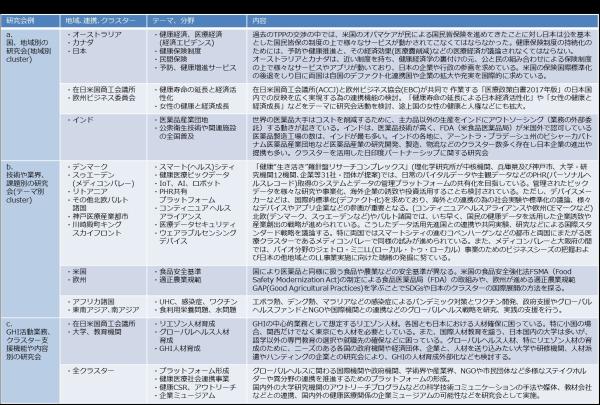
Proposed trial workshops
a. Country- and region-specific workshops (region-specific clusters)
・Australia, Canada, Japan
As discussed in the past TPP negotiations, in Japan various services have to be carried out based on the country’s public-based universal medical insurance program, in comparison to America’s “Obamacare” universal medical insurance program carried out by the private sector. To make health insurance programs sustainable, there is a need to discuss medical care economics, including prevention and health promotion and their economic benefits (reductions in medical care expenses).
Australia and Canada have similar systems founded on health economics that operate various services and mobile apps based on health insurance systems that combine the public and private sectors and seek participation from Japanese companies and government entities. While international standardization of America’s health insurance is suspended, the two countries have been seeking internationally to expand and replenish partner countries and companies for their own countries’ de facto standards.
・American Chamber of Commerce in Japan, European Business Council in Japan Consideration about partnership capabilities meant to apply the content of the ACCJ-EBC Health Policy White Paper 2017 widely within Japan, which the American Chamber of Commerce in Japan (ACCJ) and European Business Council in Japan (EBC) worked on together. Reviewing themes for workshop activities such as revitalizing Japan’s economy by extending healthy life spans and women’s health and economic growth; also expanding to women’s health and human rights in developing countries.
・India
The world’s pharmaceuticals giants have been moving to cut costs by outsourcing the manufacturing of everything other than their leading products to India. India has advanced pharmaceuticals technology and has the highest number of pharmaceuticals manufacturing plants outside the U.S. approved by the Food and Drug Administration (FDA). Numerous pharmaceuticals industry clusters for such things as R&D, manufacturing and logistics exist all around India, including the pharmaceuticals industry park in Andhra Pradesh State’s Visakhapatnam District; and many Japanese companies have also set up operations or partnerships. Workshop pertaining to Japan-India partnerships that make use of clusters
b. Technology-, industry-, and issue-specific workshops (theme-specific clusters)
・Smart (healthy) cities, health and medical care big data, IoT, AI, robots, platforms for sharing personal health records, Continua Health Alliance, medical care data security
The Compass to Healthy Life research complex program (with Riken proposed as the core organization along with the Hyogo prefectural government, Kobe city government, 12 universities and research institutes, and 31 companies and associations) is aiming for systems to acquire personal health records (PHRs) such as everyday vital and subjective data and to create shared data administration platforms. Thought is also being given to making use of the managed big data for various types of research and new projects, attracting overseas companies, and investments. However, device manufacturers and others are asking for international standardization (de facto standards), and discussion concerning field tests and standardization as well as participation by various device and application companies will be important to the goal of overseas partnerships (such as Continua Health Alliance and the EU’s CE marking).
Northern Europe (Denmark and Sweden, for example) and the Baltic nations have quickly carried out strategies to attract companies and create industries using their citizens’ health data. International standards strategies will be discussed through partnerships, joint experiments and research with these countries that have taken the lead in using such data. The same types of endeavors are proceeding in Denmark and Sweden, particularly in cities such as Copenhagen, which is promoting its “smart” city, and in the Medicon Valley medical cluster that spans both countries. Additionally, Medicon Valley and the Osaka prefectural government have taken the first steps toward trying to obtain an idea of business seeds for JETRO “local to local” (LL) small businesses and do scouting related to implementation of LL businesses with other regions in Japan in the biotechnology sector.
・Food safety standards, good agricultural practices
Safety standards for such things as foods and agriculture differ by country-for example, some countries handle foods in the same way as for pharmaceuticals. We will learn from the FDA’s efforts under the Food Safety Modernization Act enacted in the U.S. and the good agricultural practices (GAPs) the EU is promoting to investigate SDGs and ways for Japanese clusters to expand internationally.
・Universal health coverage (UHC), infectious diseases, vaccines, food use nutrition issues and water problems
Research and support are conducted concerning pandemic responses and the development of vaccines for infectious diseases (e.g., Ebola hemorrhagic fever, dengue fever, and malaria), as well as global health strategies such as partnerships among governmental support, global health funds, NGOs and international organizations.
c. Workshops that are devoted to the work of GHI efforts, cluster support functions, and content-specific
・Training liaison, global health, and GHI personnel
Liaison personnel are considered to be central to GHI tasks. Countries all have trouble acquiring human resources in Japan. Small countries particularly require personnel not just in the Kansai region, but also in Tokyo. Moreover, many universities in Japan make efforts to promote training of international human resources, but there are difficulties in providing specialized training options aside from languages and ensuring places of employment. To train global health personnel, especially liaison personnel, external training for GHI human resources will be considered through joint workshops among individual countries’ government agencies, economic organizations and companies that have needs and universities, training organizations and temp staffing and headhunting companies that want to provide personnel.
(6)その他
・連絡会議の構成機関となる海外のクラスターを支援する国際機関、政府機関、駐日の大使館や領事館、海外経済団体などの協議で試行的研究会を設置し、関係機関とその内容を検討、実施する。
・研究会を関西で開催することで、関西での実施協力機関、またリエゾン機能への期待などを強めていく。
・試行的研究会のテーマ等は、政治的環境変化などを鑑み柔軟に対応する。
・a.b.c.の各試行的研究会は、各地域とテーマの組み合わせなども検討。
・関係者のニーズが高い場合は、同一のテーマや地域で継続的に実施していく
・試行的研究会ごとにその構成メンバーや運営方法(セミナーや勉強会、商談会、共同研究、イベント等)、実施経費、運営人材なども検討する。
・研究会の自立化方法としては、主催者予算、構成機関予算、参加者の会費や、ヘルスクラスターや地域などからの委託費、公的補助金等の獲得、企業協賛などを組み合わせて検討。
(6) Other
・The international and government organizations, embassies and consulates in Japan, foreign economic organizations and others who support overseas clusters that will be the liaison conference’s constituent organizations will discuss and set up trial workshops, review and implement the content of support with relevant organizations.
・Holding workshops in the Kansai region will intensify expectations regarding organizations that will assist with implementation in the Kansai and liaison functions.
・Trial workshop themes will be handled flexibly, taking changes in the political environment into account.
・Combinations of the regions and themes for the respective trial workshops (a, b, and c) will also be considered.
・When the concerned parties are in strong need, workshops will be conducted continuously with the same themes, in the same regions.
・The constituent members for each individual trial workshop; how to run seminars, study groups, business meetings, joint research, events, and so on; implementation costs; management personnel; and other matters will also be discussed.
・Concerning ways to make workshops independent, budgets for promoters and constituent organizations, participants’ dues, commissions from health clusters or regions, public subsidies, corporate co-sponsorship, etc. will be also discussed in combination.
3.グローバルヘルスイニシャティブの活動の流れ
(1)関係機関連絡会議からGHI準備会議への移行
・関係機関連絡会議の継続 (第2回を11月7日開催)
・試行的研究会の開催に関して関係する機関との分科会の開催
・活動のマイルストーンとスケジュールの設定
3. GHI activity flow
(1) Shift from liaison conference for relevant organizations to GHI preparatory conference
・Continuation of liaison conference for relevant organizations (second session held on November 7)
・Holding subcommittee meetings with relevant organizations concerning holding trial workshops
・Setting up activity milestones and schedules
(2)大まかな活動の流れ

(2) Approximate activity flow
(3)2017年から2018年のスケジュール案
・試行的研究会やプレ事業を重ね、GHIの事業内容の構築と関連機能の充実、担当業務遂行のの主たる機関や人材の発掘教育へと結び付けていく。併せてWEBなどの情報発信を行う。
・関係機関連絡会議(9/5、11/7他)での要望や決定事項などにより柔軟なスケジュール対応する。
(3) Proposed schedule from 2017 to 2018
・Repeating trial workshops and preliminary programs will lead to establishment of GHI project content, enhancement of related functions, scouting and training of the main organizations and personnel who will carry out tasks that will be handled. Information dissemination will also be conducted on the web and elsewhere at the same time.
・The scheduling will be handled flexibly, in accordance with requests from and matters decided at the liaison conference for relevant organizations (September 5, November 7, and other dates).
4.グローバルヘルスイニシャティブの想定機能
①機能検討の流れ
・関係機関連絡会議などで要望される機能の中から優先順位を設定。
・機能の検討を試行的研究会のCにて開始。
・特に推進するための人材の発掘や育成に注力
・関連する支援機能を保有する他機関などとの情報交換や連携促進
・組織形態の検討
・拠点の施設(立地や設備事業、手法等)の検討
・段階的推進と先行事業の検討
4. Functions envisioned for GHI
① Flow of consideration of functions
・The order of priorities will be set for functions requested at the liaison conference for relevant organizations.
・Consideration of functions will begin at trial workshop C.
・Particular emphasis will be placed on scouting and training human resources for promoting GHI.
・Exchanging information and promoting cooperation with other organizations that possess related support functions.
・Consideration about the organizational format.
・Consideration about office facilities (locations, facilities projects, methods, and so on).
・Consideration about incremental promotion and prior programs.
②想定する業務サービスの一例として
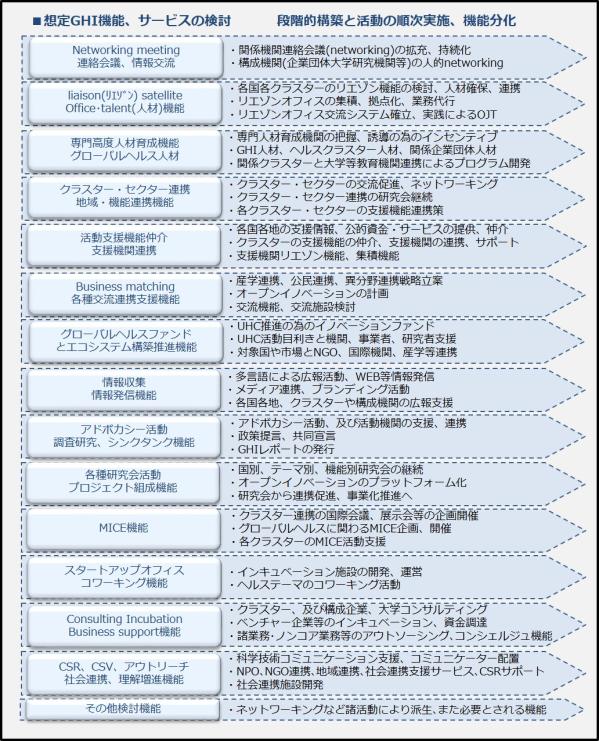
② Examples of business services envisioned
・Networking meetings, liaison conference, information exchange
Expanding networking at liaison conference for relevant organizations, continuity, and also interpersonal networking among constituent organizations (including companies, associations, universities, and research institutes)
・Liaison satellite office, human resource functions
Considering individual countries’ and clusters’ liaison functions, acquiring personnel, partnerships
Making clusters and operation bases of liaison offices, providing agency services, establishing system for interaction among liaison offices, and conducting on-the-job training through actual practice
・Specialized, high level personnel training functions, global health human resource training
Getting information about specialized human resource training organizations; incentives for attracting talented personnel; GHI and health cluster human resources; relevant corporate association human resource training and related clusters; coordinating with universities and other educational institutions to develop programs
・Cluster partnerships, regional and functional partnership functions
Promoting interaction among clusters; networking; continuing cluster partnership workshops; partnership plans for individual clusters’ support functions
・Activity support function intermediation, support organization partnerships
Provision of support information of individual countries and regions; provision and intermediation of public funding and services; cluster support function intermediation; partnerships among support organizations and support for such; support organization liaison functions and cluster functions
・Business matching, all sorts of interaction and partnership support functions
Proposing strategies for industry-academia partnerships, public and private sector partnerships, and partnerships among different sectors; open innovation plans; consideration for interaction functions and networking facilities ・Global health fund and ecosystem building promotion functions
Innovation funds to promote UHC; UHC activity authorities and organizations; enterprises; countries, markets and NGOs eligible for researcher support; international organizations; industry-academia partnerships
・Information gathering and dissemination functions
Multilanguage PR activities; transmitting information via the web and in other ways; media partnerships; branding activities; PR support for individual countries, regions, clusters and constituent organizations
・Investigative research, think tank functions
Policy proposals, joint declarations, issuing GHI reports
Advocacy Activity and support
・Various workshop activities, project formulation functions
Continuation of country-, theme-, and function-specific workshops; creating open innovation platforms; promoting partnerships from workshops; promoting to launch projects
・MICE (meetings, incentives, conferencing, exhibitions) functions
International conferences related to cluster partnerships; planning and holding exhibitions and other events; planning and holding MICEs related to global health; supporting individual clusters’ MICE activities
・Start-up office and co-working functions
Develop and run incubation facilities; health-themed co-working activities ・Consulting incubation, business support functions
Cluster, constituent company, and university consulting; venture company and other incubation; funding procurement; outsourcing miscellaneous and non-core tasks; concierge functions
・CSR, CSV, outreach, society partnership, function to augment understanding
Science and technology communication support; posting communicators; NPO, NGO, and community partnerships support services; CSR support; development of community partnership facilities
・Other functions thought to be needed
②想定する業務サービスの一例として
1)リエゾン(サテライト)オフィス
・各国や地域、団体などのヘルス領域の様々な日本国内の活動(研究開発やビジネス支援、クラスター連携、国際連携の支援、産学や異分野を含むビジネスマッチング支援)を代行するリエゾン担当を関西の拠点に集積させることで、より深いネットワーキングを実現する。
・各国やクラスターより選ばれたリエゾン担当の他、GHIにより言語や地域、産業領域や目的などにより選別されたリエゾン人材が代行する。
・リエゾン担当により収集される情報の各国言語による配信やネットワーキング会議を日常活動として実施。
・海外を含む国内外の本分野の支援機関、支援機能のリエゾン機能も配置する。
リエゾン機能の集積イメージ

1) Liaison (satellite) offices
Illustrated rendering of liaison function clusters
・Even more intensive networking can be achieved by clustering liaison representatives in Kansai regions sites who carry out various health field activities (including R&D and business support, cluster and international partnership support, and business matching support that includes industry, academia, and other sectors) in Japan on behalf of individual countries, regions, and organizations.
・In addition to liaison representatives selected by individual countries and clusters, liaison personnel screened based on GHI by such things as language, region, industry field and purpose will act as agents.
・As routine activities, information that liaison representatives gather will be disseminated in individual countries’ languages, and networking meetings will be conducted.
・Liaison functions will also be assigned to support organizations and support functions in this field in Japan and overseas.
2)専門人材育成
・GHIのリエゾン人材、支援人材、活動に携わる専門人材などの育成
・本分野に関わる日本での雇用人材の育成
・国内外の異分野での学学連携、大学連携、高大連携、研修機関連携などによるプログラムの開発やコースの設定、資格制度などの検討
2) Training specialized human resources
・Training GHI liaison personnel, support personnel, and specialized human resources to engage in activities
・Training and employing human resources in Japan who will be involved in this sector
・Consideration for developing programs, establishing courses and qualifications systems through partnerships between schools of different fields, partnerships among universities, partnerships between universities and senior high schools, and partnerships among training organizations in Japan and elsewhere
3)支援機関集積
・関連する支援機関(国や自治体などの公的支援機関から民間支援機関)を拠点に配置する。
・国内外のクラスターや企業、大学等に日本国内と同等のサービスを提供する。
・各クラスターの支援機関などのデータベース化とそのネットワークを促進し、相互協力関係を構築する。
3) Support organization clusters
・Related support organizations (everything from public, national and local government support organizations to private sector support organizations) will be deployed as operation bases.
・Clusters, companies, and universities in other countries will be provided services equal to those within Japan.
・Mutually cooperative relationships will be built by promoting the creation of databases of individual clusters’ support organizations and such and expanding their networks.
4)インキュベーション、コンサルティング案
・日本進出に対する海外企業等の支援策、コンサルタント業務などの情報、手続のワンストップ窓口によるサービスを受けせられる体制を構築する。
・特に医薬品や医療機器の場合、日本国内での承認が前提となり、日本進出の初期段階では大企業であっても連絡事務所や駐在員事務所のほか、アウトソーシングを担う弁護士やコンサルタントなどを代理人として情報収集や各種の調査、行政手続きなどをスタートすることが多い。その後、薬事などの承認後に基本的なマーケティング戦略を確立することで、大きく日本市場への進出となる。その成長期、拡張期などの各段階でも外部アウトソーシングしたコンサルテーションを受けることとなる。
4) Incubation, consulting proposals
・Devising systems for receiving “one stop” services related to support measures for overseas companies establishing operations in Japan, information about consulting operations, and procedures.
・Domestic authorizations are prerequisites particularly in the case of pharmaceuticals and medical care devices in Japan, and even major corporations often start the initial phase of setting up in Japan with agents (such as lawyers to handle outsourcing or consultants) in addition to a liaison or representative office, in order to gather information and carry out various kinds of surveys and administrative procedures. After authorization for pharmaceuticals and so on is obtained, they broadly enter the Japanese market by establishing basic marketing strategies. They also receive consulting from outside parties during each growth and expansion phase.
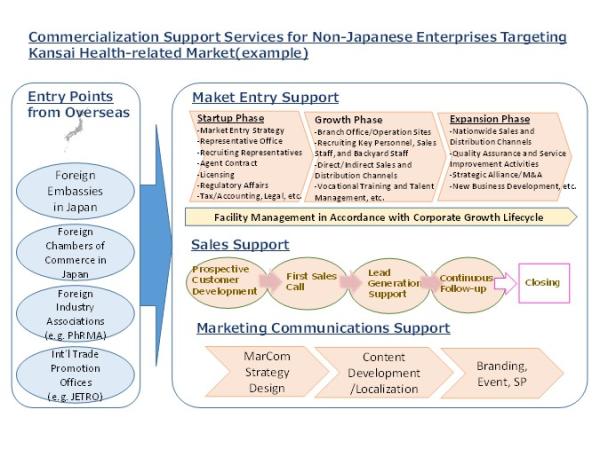
5)各クラスターへの企業誘致支援やビジネスマッチング
・国内外のクラスターのニーズの一つとなる投資促進や企業誘致を支援する。
・国内外の各クラスターの構成企業や大学研究機関と他のクラスターの構成企業や大学研究機関のビジネスマッチングを支援する。
・国内外クラスターのオープンイノベーションの為の情報収集、情報発信の他、クラスター連携を促進する多様な企画やプラットフォームの確立を支援する。
・各クラスターの実施する各種企画の情報発信
5) Support to help individual clusters attract companies and business matching
・Support the need of clusters in Japan and other countries to promote investment and attract companies.
・Support business matching of clusters’ constituent companies and university research organizations with those of other clusters in Japan and other countries.
・Along with gathering and disseminating information to promote open innovation in clusters in Japan and other countries, support the establishment of various plans and platforms to promote cluster partnerships.
・Disseminate information about the various plans individual clusters conduct.
6)UHC(Universal health coverage)とSDGs実現のためのグローバルヘルスのエコシステム確立
・国際的な多様な主体の連携による途上国、支援対象国のUHCや感染症対策の実現 ・イノベーティブな技術やビジネスモデルがUHCのニーズを理解し課題解決のためのR&Dや産学連携、国際承認、政府支援や国際ファンドとの効果的マッチングと支援対象国での末端までの物流や商流確立による仕組みづくりを実施。
・グローバルヘルスやUHCの課題解決に資するイノベーティブな技術や人材、企業の発掘と成長支援。
・経済的な依存関係や協調関係、または強者を頂点とする新たな成長分野でのピラミッド型の産業構造といった、新規な産業体系を構成しつつある発展途上の分野や地域、市場での企業や政府機関、NGOなどの国際連携を確立する。
・ドネーションや国際支援から経済的市場形成への仕組みづくり。
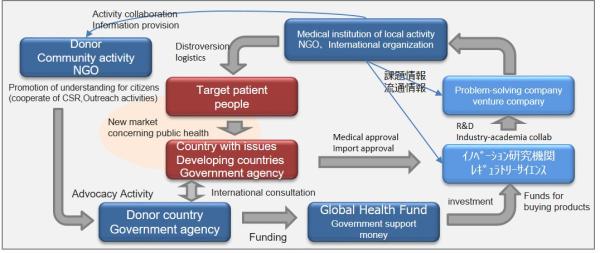
6) Establishing a global health ecosystem so that UHC and SDGs can be achieved
5.本活動との関係事業、関西での展開
・健康医療関連の各種プロジェクトとの連携
・関西イノベーション国際戦略総合特区と関西各都市のヘルスクラスターの活用推進
・関西の健康医療関連のアカデミアの活動との連携
・2020年オリンピックパラリンピック
・2021年world master games 関西
・2025年ライフサイエンス分野の日本国際博覧会招致活動
「いのち輝く未来社会のデザイン」
・各都市、各地域の大型都市開発との有機的連携
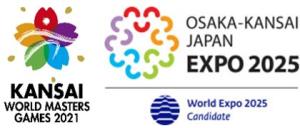

5. Programs and projects related to these efforts, Kansai area operations
・Partnership with various projects related to health and medical care
・Promote use of the Kansai Innovation Comprehensive Global Strategic Special Zone and various Kansai region cities’ health clusters
・Coordinate with academia’s efforts related to Kansai area health and medical care
・2020 Olympics and Paralympics
・World Masters Games 2021 Kansai
・Efforts to attract the life sciences sector 2025 World Expo to Japan
“Designing future society for our lives”
・Organic partnership with individual cities’ and regions’ major urban development
6.本構想のお問合せ(事務局)
・大阪商工会議所 経済産業部 ライフサイエンス振興担当
540-0029大阪市中央区本町橋2-8
担当 東(azuma) ℡: 06-6944-6484
e-mail: j-azuma@osaka.cci.or.jp
・公益財団法人都市活力研究所
〒530-0011大阪市北区大深町3-1 グランフロント大阪ナレッジキャピタルタワーC 7F
担当 味村(mimura) ℡: 06-6359-1322 e-mail: mimura@urban-ii.or.jp
・新産業文化創出研究所
〒101-0021 東京都千代田区外神田4-12-2 ウチダビル3F
担当 廣常(hirotsune) ℡:03-5297-8200 e-mail: hirotsune@icic.jp
6. For more information about this plan (executive offices)
・Life Science Industry Promotion Group, Economic and Industries Division, Osaka Chamber of Commerce and Industry
2-8 Honmachibashi, Chuo-ku, Osaka City 540-0029
Phone: 06-6944-6484
Email: j-azuma@osaka.cci.or.jp
Contact: Jun-ichi Azuma
・Urban Innovation Institute
7F, Knowledge Capital Tower C, Grand Front Osaka, 3-1 Ofukacho, Kita-ku, Osaka City 530-0011
Phone: 06-6359-1322
Email: mimura@urban-ii.or.jp
Contact: Kazuhiro Mimura
・Institute of Creative Industries and Culture
3F Uchida Building, 4-12-2 Sotokanda, Chiyoda-ku, Tokyo 101-0021
Phone: 03-5297-8200
Email: hirotsune@icic.jp
Contact: Keiichi Hirotsune

